Each objection you hear allows you to raise your price.
Many people believe an objection means a problem and a discount. Since I’ve always taken a contrarian approach to sales, I believe just the opposite. When the customer voices an objection, that means they’re thinking and engaging with the sales process. It also means there must be at least somewhat of an interest in buying.
To me this represents something that should be explored more with the customer — first to respond to their objection and second to build on their thinking to create a more urgent need to buy. When the customer has a strong urgency to buy, either due to time or the value they expect to obtain from what you’re selling, they’re willing to pay for it and more than likely pay even more.
Next time the customer throws you an objection, take the time to explore the objection by first validating if the objection is real. Then use questions to further engage the customer and have them build more on their objection, especially if you’re confident you can respond favorably to the objection.
By getting the customer to build on their concern, you’re getting them to be even more engaged and connected with the product or service you’re selling and how you can alleviate their concern. Once you’re able to answer their concern, move immediately forward with a closing statement at full price — even your highest price point.
If the concern the customer has is real and you’ve been able to get them to build on the issue, then by providing them with the right response, you’ll have a self-motivated buyer.
The worst thing that can happen to you is the buyer rejects your attempt to close. If that is the case, then you merely respond to them with another question, getting them to explain to you even more about their original objection. Their response then gives you a chance to repeat the process again, thus setting up another opportunity to close the sale.
If the customer is not pleased with your response to their objection, do not think you’ve lost the sale. On the contrary, their continued objection provides you with an opportunity to find a greater value you can help them realize.
You do this by asking the customer a question regarding something else they have expressed to you. The objective here is to get the customer to share with you another benefit they like about what you’re selling or for them to share with you another need they’re looking to fill. In either case, it gives you another avenue to explore. If the avenue is big enough in the mind of the customer and you’re able to satisfy the need, then the customer may feel driven to not allow their previous objection to prevent them from buying from you. Again, this creates an opportunity to minimally sell the customer at full price or even more, if the benefits are significant enough for the buyer.
So the next time an objection comes your way, see it as an opportunity to sell — at a higher price.
Copyright 2010, Mark Hunter “The Sales Hunter.” Sales Motivation Blog.












One Response